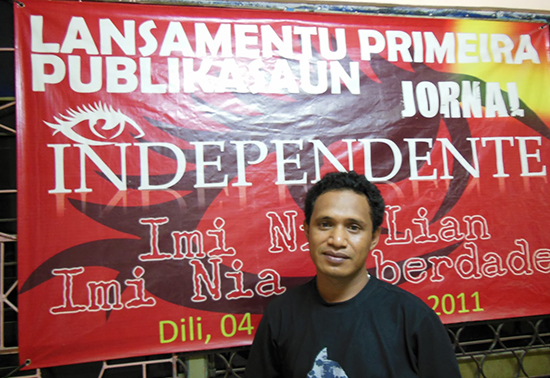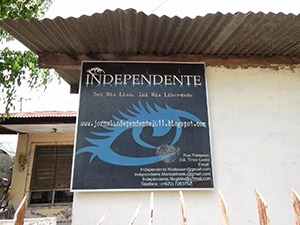
PROFILE: While the Timor-Leste media industry was rejuvenated by a national congress in October that voted on a new code of ethics, one of the country's most independent chief editors has warned against the risks of a "media council elephant".
Mouzinho Lopes de Araujo, editorial director of Timor-Leste's newest paper, the Independente, is proud of the progress of the country's fledgling media but says there are still many problems to address.
"There are many impediments to a free press in Timor-Leste," he says. "We don't really have a free press in this country. The press is all about what the government is doing and celebrations." A draft media law is currently before the national Parliament and it is widely feared that a journalist licensing system and criminal penalties could be imposed as in Fiji and mooted in Papua New Guinea.
A draft media law is currently before the national Parliament and it is widely feared that a journalist licensing system and criminal penalties could be imposed as in Fiji and mooted in Papua New Guinea.
"The government is only interested in getting its own agenda across in the media, not what the people want," Lopes says.
"If we try to raise issues that are outside the government agenda, the reply we get is: 'We have no time to talk about this' or 'This is a state secret'.
"Here at the Independente, we're trying to break free from this mould and be independent. We want to cover other issues, not just the government's agenda.
"But the trouble is as soon as we raise an issue or questions, the government responds by saying this or that party is behind the story. There is no freedom to raise the people's issues.
"Our masthead motto is: 'Imi Nia Lian, Imi Nia Liberdade' - 'Your voice, your freedom' - and we run the newspaper based on this approach. And I think we live up to the motto - we have no political party influence."
Both Lopes - known as "Mouzy" to friends and colleagues - and a volunteer Australian journalist with South African experience working at the newspaper, Rowena McNaughton, believe non-government oganisations could raise a higher profile in the country for grassroots people.
Training advisers
The Independente has made wide-ranging and constructive use of foreign media advisers, trainers and volunteers - seven since it began in April 2011 - and believes it is raising standards.
"A lot of people don't want to speak out. They're afraid of losing their jobs if they take a stand on the record.
"The media in Timor-Leste is at a cross-roads. The media is in transition with the new code and hopefully things will improve. Every editor and journalist in Timor-Leste wants to do their best for the country and to follow their ethics.
"We're all trying to get better."
The October self-regulatory media congress was well attended by 150 journalists and with a lot of enthusiasm.
"For me three things stood out: Our journalists are committed to ethics; our journalists are united for a better media; and concerns over the role of the government in the background," says Lopes.
"We want to act now. We want to get on with working in this new media environment. But also we have higher ideals than the press council, we are committed to good journalism for this country.
New journalism
"When we started the Independente, we wanted to produce a very different newspaper. I was chief editor at the time on the Timor Post, but I saw this new newspaper as a challenge to put in place a new form of journalism.
What are the differences?
"We don't just tell only what the government wants to tell the people. We tell what ordinary people want to say, we are more responsive to the public," Lopes responds.
"Timor-Leste has many diverse groups in the country - rich people, poor people; Tetun-speaking people, Portuguese-speaking people, Indonesian-speaking people, English-speaking people. We serve them all.
The Independente is unique in regularly publishing an English-language page, including many background issue news features.
For example, at the time of the interview the Independente published a four column article about the issue of "forced disappearances" during the 24 years of illegal Indonesian occupation of Timor-Leste after independence was declared in 1975.
Stalling 'abuse'
The article concluded that by stalling over the issue and calls for justice by the families of the disappeared and civil rights advocates, the Timor-Leste government inactivity was itself "akin to human right abuse".
But the article was not translated into Tetun.
The allegations over Australian spying on Indonesia and Timor-Leste controversy were also been getting full coverage in English and Tetun last month.
"Compared to the other dailies, the Independente has more of a focus on ordinary people. Most of the others only report what the political leaders have to say, what Parliament has to say - that is our big difference," says Lopes.
"Another factor is the quality of editing and other papers also compliment us on the quality of editing."
Editorial team
The Independente has nine reporters, including three regional correspondents in Baucau, Lautem and Ainaro, and four editors, including Lopes as editorial director.
Lopes himself is arguably the only journalist in Timor-Leste with a full media qualification at a recognised journalism school.
He studied for three years in Papua New Guinea in 2002-5, where he gained the Diploma of Communication Arts at Divine Word University in Madang.
The principal owner, Oscar Lima, a prominent businessman understood to have political ties to Fretilin, is committed to independent journalism.
The newspaper has a daily circulation of about 500 and is printed by an Indonesian company, Grafika Patria. It maintains an "open" Independente page on Facebook and is considering starting a website.
Student readers
It also gives away free newspapers to students in an effort to be more widely read - as young Timorese mostly get their news from online sources in a country that has less than two percent of its 1.07 million population on the internet.
Ironically, the Independente is produced in a dingy office at the end of Rua Palapaco in the central suburb of Farol, a street next to the Indonesian Embassy.
"The media industry in Timor-Leste is in a fragile state. It is up to he editors and journalists to raise our game," says Lopes.
"We need to adhere to good ethics and to have good media law. We don't want a bureaucratic press council elephant or media freedom will be destroyed.
"So we need a good media council. We don't need the Australian way. We don't need the Portuguese way - where all members are selected by Parliament. We don't need the Indonesian way.
'Own way'
"We need to put things together in our own way and make our own decisions. We need a media council that reflects the Timor-Leste situation.
"A draft media law was written by a Portuguese lawyer. All the journalists rejected it. It will not happen.
"We don't want the government to just be all sweetness like sugar with the journalists being attracted to all the jam."
Asked about payments to journalists, cited at the congress as being up to US$5-20 for attending press conferences or up to US$40 when accompanying ministers on visits to the districts, de Araujo is critical.
"I have never personally experienced an example of 'envelope journalism' - a common practice in Indonesia where cash inducements are paid out to journalists - or seen money being handed over.
Practice exposed
"In our own newsroom, we have a policy of covering events only if we regard them as newsworthy, not if there are inducements to turn up.
"But we ran a story several months ago exposing this practice when a reporter took pictures of a minister's handout involving another newspaper.
"News media is a new concept for the Timorese. It has really only been seriously developed since the renewal of independence just over a decade ago.
'Many rural people do not understand what the media is. What is journalism?"
Proud of media
During the quarter century of Indonesian education in Timor-Leste, there was no media subject in schools.
"We are proud of how the media has grown in Timor-Leste in a short time, says Lopes.
"Unlike some Pacific countries where the media has been dominated by foreign ownership, we have done everything by ourselves - and we have a lot to offer the country in the future."
Pacific Media Centre director Dr David Robie has been on a sabbatical visit to Timor-Leste and was a volunteer attached to La'o Hamutuk (Timor-Leste Institute for Development Monitoring and Analysis). David was member of a NZ Electoral Commission media monitoring team to Timor-Leste in 2007.



